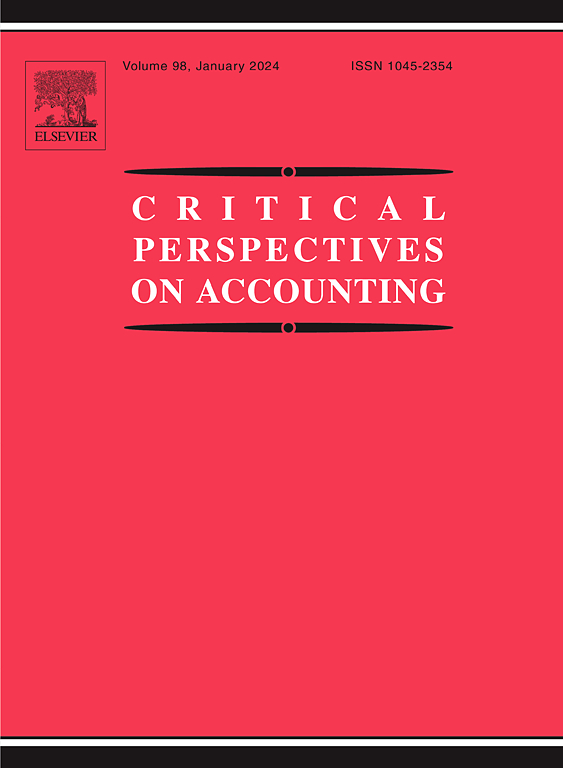在灾后援助的指责游戏中基于问责制的会计
IF 5.7
2区 管理学
Q1 BUSINESS, FINANCE
引用次数: 0
摘要
本文比较了1915年意大利马西卡地震后援助的两种问责制。两个交代者,即政府和一个私人委员会,分别面临敌对和有利的问责环境,因为新闻媒介和公众舆论严厉批评政府当局的反应,并赞扬私人的主动行动。为实行问责制而采用的会计制度是根据问责制论坛的不同倾向来解读的。委员会展示了所有可用的会计做法,包括论述性的、计算性的和目视性的,而政府主要依赖于论述性的做法,只展示了一些选择的计算性做法,引导受众了解具体的避免指责的评价标准。通过提供一个会计的“进攻性”和防御性使用的例子,该研究有助于我们理解自然灾害后情景中会计、问责制和逃避责任之间的关系。本文章由计算机程序翻译,如有差异,请以英文原文为准。
Accountability-based accounting in the blame game for post-disaster aid
The paper compares two accountability systems concerning the aid provided after the Marsica earthquake occurred in Italy in 1915. The two account givers, the Government and a private Committee, face a hostile and favourable accountability environment respectively, because the media and public opinion severely criticized the response by the public authorities and praised the private initiative. The accounting systems adopted to operationalize the accountability systems are read in the light of the different dispositions of the accountability forums. While the Committee displays the full range of accounting practices available, discursive, calculative, and visual, the Government mainly relies on discursive practices and only exhibits a selection of calculative practices directing the audience towards specific blame-avoidance evaluation standards. By providing an example of an ‘attacking’ and defensive use of accounting, the study contributes to our understanding of the nexus between accounting, accountability, and blame avoidance in a post-natural disaster scenario.
求助全文
通过发布文献求助,成功后即可免费获取论文全文。
去求助
来源期刊

Critical Perspectives on Accounting
BUSINESS, FINANCE-
CiteScore
9.40
自引率
7.80%
发文量
91
期刊介绍:
Critical Perspectives on Accounting aims to provide a forum for the growing number of accounting researchers and practitioners who realize that conventional theory and practice is ill-suited to the challenges of the modern environment, and that accounting practices and corporate behavior are inextricably connected with many allocative, distributive, social, and ecological problems of our era. From such concerns, a new literature is emerging that seeks to reformulate corporate, social, and political activity, and the theoretical and practical means by which we apprehend and affect that activity. Research Areas Include: • Studies involving the political economy of accounting, critical accounting, radical accounting, and accounting''s implication in the exercise of power • Financial accounting''s role in the processes of international capital formation, including its impact on stock market stability and international banking activities • Management accounting''s role in organizing the labor process • The relationship between accounting and the state in various social formations • Studies of accounting''s historical role, as a means of "remembering" the subject''s social and conflictual character • The role of accounting in establishing "real" democracy at work and other domains of life • Accounting''s adjudicative function in international exchanges, such as that of the Third World debt • Antagonisms between the social and private character of accounting, such as conflicts of interest in the audit process • The identification of new constituencies for radical and critical accounting information • Accounting''s involvement in gender and class conflicts in the workplace • The interplay between accounting, social conflict, industrialization, bureaucracy, and technocracy • Reappraisals of the role of accounting as a science and technology • Critical reviews of "useful" scientific knowledge about organizations
 求助内容:
求助内容: 应助结果提醒方式:
应助结果提醒方式:


